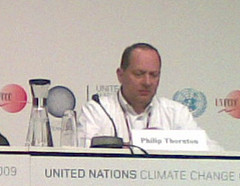ILRI systems analyst Philip Thornton, participating in a media panel at the COP15 climate change conference in Copenhagen, December 2009 (photo by ILRI / P Kristjanson).
Publication this week of 21 papers in a special open-access edition of The Philosophical Transactions of the Royal Society, part of a UK government Foresight study on the future of the global food industry, is causing a bit of a stir. The mass media are focusing on the wilder predictions, such as the possibility that we may be growing meat artificially, in vats, to feed the 9 billion-plus people expected to be alive at mid-century.
But more importantly, this major academic assessment of future global food supplies, led by John Beddington, the UK government chief scientist, argues that although big, the challenge of increasing global food supplies by as much as 70% in the next 40 years is not insurmountable and many of the papers are optimistic.
What is needed in addition to novel approaches to increasing food production, they say, are better uses of an array of low-tech to high-tech solutions, some already available, others needing refinement or a rethink for meeting the needs of the world's vast army of smallholder farmers.
As the Guardian article reports: 'Other papers suggest a radical rethink of global food production is needed to reduce its dependence on oil. Up to 70% of the energy needed to grow and supply food at present is fossil-fuel based which in turn contributes to climate change.
'"The need for action is urgent given the time required for investment in research to deliver new technologies to those that need them and for political and social change to take place," says the paper by Beddington.
'"Major advances can be achieved with the concerted application of current technologies and the importance of investing in research sooner rather than later to enable the food system to cope with challenges in the coming decades," says the paper led by the population biologist Charles Godfray of Oxford University.'
Regarding novel ideas on the horizon, in an interview with the Guardian, Philip Thornton, a scientist with the International Livestock Research Institute (ILRI), based in Nairobi, and an author of one of the papers, said conventional animal breeding may be insufficient to meet the anticipated doubling of demand for dairy and meat products in Asia and sub-Saharan Africa, and to do so in sustainable ways. Thornton described two 'wild cards' that could transform global meat and milk production: 'One is artificial meat, which is made in a giant vat, and the other is nanotechnology, which is expected to become more important as a vehicle for delivering medication to livestock.'
But Thornton cautions against holding out hope for any one technology to solve our looming global food insecurity. He says we need to invest now in options across the whole gamut of agricultural development. Livestock development in poor countries, he says, 'will increasingly be affected by competition for natural resources, particularly land and water, as well as competition between food and feed, and by the need to operate in a carbon-constrained economy.' To help the world's 600 million small-scale farmers and herders increase their production and do so more efficiently, he says, will require continuing advances in the three pillars of livestock development–breeding, nutrition, and animal health.
The final Foresight report will be published later this year in advance of the UN climate talks in Cancun, Mexico.
Read more at: Philosophical Transactions of the Royal Society B: Biology, Livestock production: recent trends, future prospects, by Philip Thornton.
The Guardian: Artificial meat? Food for thought by 2050, 16 August 2010

